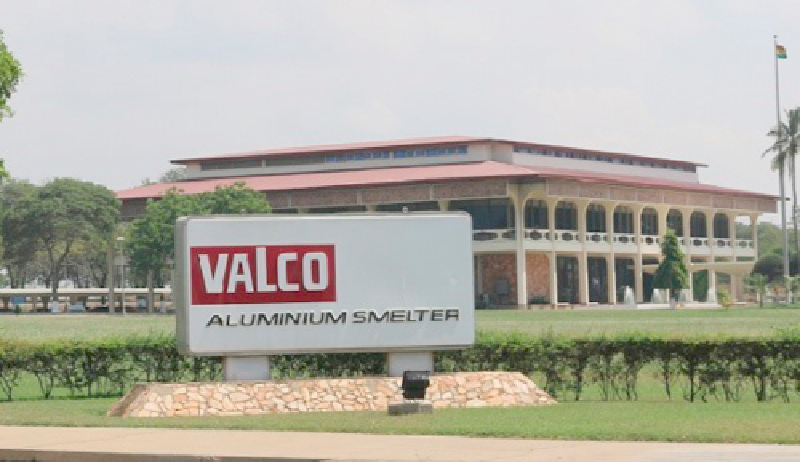The Volta Aluminium Company (VALCO) was established as a collaborative venture between the Government of Ghana and Kaiser and Reynolds of the United States of America.
VALCO started operations in 1967, with ownership then vested in Kaiser Aluminum and Chemical Corporation (Kaiser) and Reynolds Metals Corporation (Reynolds).
Kaiser owned 90% of the shareholdings and the remaining 10% by Reynolds, but Reynolds sold its shares to Aluminum Company of America (Alcoa) before the Company began operations in 1967.
Ghana’s first President, Kwame Nkrumah identified the Integrated Aluminium Industry (IAI) as the starting point to Ghana’s industrialization agenda. With Ghana already having an operational bauxite mine in Awaso, Nkrumah saw the proposal by Kaiser Aluminium to establish a refinery and the VALCO smelter as timely and a major step towards the realization of an Integrated Aluminium Industry. The establishment of the Volta Aluminium Company was one of the main requirements for the realisation of the Volta River Project that established the Akosombo Hydroelectric Dam.
VALCO was built with an installed capacity of 200,000 metric tonnes of refined aluminium per year. The Aluminium smelter was run by private partners and for more than 60 years, imported alumina from oversees to feed the plant.
VALCO has gone through turbulent phases including a series of shutdowns largely due to the lack of investment, repairs, and maintenance. In 2008, the Government of Ghana, under former President John Agyekum Kufuor, acquired Kaiser’s shares in VALCO making it a wholly Ghanaian owned Company. The plant has been operating with the same dated technology and obsolete equipment inherited from the previous owners (Kaiser Aluminium and Alcoa) and has one of the highest production costs per a ton of aluminium globally.
The lack of capital injection and modernization of the plant, over the years, has led to VALCO operating under capacity and recording loses.
President Akufo-Addo, with his vision to industrialize and transform Ghana’s economy; birthed the Ghana Integrated Aluminium Development Corporation (GIADEC) in 2018 with a mandate to develop and promote Ghana’s Integrated Aluminium Industry (IAI).
VALCO in the Integrated Aluminum Industry Project
GIADEC is mandated by its enabling Act of 2018 (Act 976) to develop Ghana’s Integrated Aluminium Industry spanning bauxite mining, alumina refining, aluminium smelting and downstream aluminium products manufacturing. In this pursuit, Government’s 100% ownership of VALCO has been transferred to GIADEC. Also, per the Master Plan of GIADEC, VALCO has been made the anchor of the IAI Project, linking the upstream and downstream sectors of the aluminium industry.
VALCO, being the only existing Smelter in Ghana, is required to expand its production from the current 40,000tpa to 300,000tpa of aluminium, implying that the Company’s production capacity must be increased by 650%. To achieve this target, VALCO requires significant transformation to retrofit its old and obsolete potlines as well as other production facilities, plant and equipment to more modern and efficient technology. The fully retrofitted VALCO Smelter will increase its installed capacity to a fully operational 300,000 tpa.
VALCO’s retrofitting project
The VALCO retrofitting project involves the replacement of the five (5) obsolete P69 Potlines and associated plant and equipment of the Smelter to a modern and more efficient smelting technology. GIADEC and VALCO have assessed the financial needs for the retrofitting Project and have estimated it at Six hundred million United States Dollars (USD600,000,000)
The Retrofitting will be done in two phases to enable production to continue without supply interruptions to the burgeoning local downstream companies.
Cabinet Approval
In June, 2022, Cabinet granted approval for Ghana Integrated Aluminium Development Corporation (GIADEC) and the Volta Aluminium Company Limited (VALCO) to identify and engage a Strategic Partner with the financial and relevant capacity to provide the needed investment and technical wherewithal plus strategic international linkages.
Future State of VALCO
The implementation of Project 4 – the modernisation and expansion of the VALCO smelter to improve efficiency and increase capacity; is to ensure that VALCO is positioned to sustainably grow and be profitable and contribute towards establishing and realising the linkages of the upstream and downstream components of the Master plan for Ghana’s IAI. The mordenisation and retrofitting of the VALCO smelter will increase the plant’s current production of 50,000 to new installed capacity of 300,000 tonnes that will be a major boost to realisation of the plan.
Benefits of a retrofitted and modernized VALCO
The retrofitting is designed to transform VALCO from a loss-making entity into a best-in-class profit-making and shareholder value-maximising entity, promoting the Government’s industrialisation agenda and contributing substantially to the socio-economic development and growth of the Ghanaian economy.
VALCOs smelting operations will allow significant value addition to Ghana’s bauxite resources.
It is estimated that on an annual basis, 1.5mt of bauxite valued at approximately USD75million can generate USD180million after refinery and USD600million after smelting.
Smelting is the key linkage between the upstream and downstream sector of the aluminium industry where a tonne of aluminium can generate USD6,000 – which is three times the value after smelting (USD2,000 per tonne).
VALCO operating at 40% capacity currently employs about 750 workers. After retrofitting and modernizing the plant to increase production from the current 50,000 to 300,000 tonnes of aluminium per annum, the smelter will create high-paying direct plus indirect jobs in the thousands for Ghanaians.
With the projected increase in the production of aluminium of about 300,000 metric tonnes per annum, coupled with a favourable aluminium market, though volatile, Ghana is expected to rake in additional revenue from the successful execution of Project 4 – the modernisation and expansion of the VALCO smelter, whilst improving the country’s GDP substantially.
Ghana’s downstream aluminium industry is currently anchored by the VALCO smelter which produces primary aluminium. 20% of what VALCO produces is used by local entities producing semi-processed and end-user materials. The products produced locally include electrical cables and conductors, holloware (including pots and pans) and roofing sheets. The downstream industries are significantly driving the demand for aluminium, thereby providing an impetus to the demand growth for aluminium.
Ghana’s downstream sector remains underdeveloped using less than 7,000 tonnes of the about 50,000 tonnes of aluminium VALCO currently produces. With a forecast of about 300,000 metric tonnes of aluminium after VALCO has been retrofitted, GIADEC is working to revive and expand the downstream sector to take advantage of the excess aluminium that will be produced.
GIADEC’s vision for the downstream is to drive the utilisation of locally produced aluminium products in Ghana and beyond. Each year, Ghana imports up to 45,000 tonnes of aluminium products, and GIADEC’s aim is to have many of these products produced locally, instead. There are many opportunities to increase the local production of aluminium products in the construction, automotive and packaging sectors, amongst others.
Through partnerships and in concert with other agencies, GIADEC will encourage the local production of aluminium products, thereby substituting current imports and the development of markets across the continent through enabling institutions such as the AfCFTA, as well as take advantage of other global opportunities.
Project 4 – the retrofitting and modernization of VALCO is, thus, key to achieving the vision for the downstream.
With the rise in the price of aluminium on the world market in recent months – rising to more than $4,000.00 per tonne – the timing for executing Project 4 is right. Aluminium prices are currently hovering around $3,000 per tonne and forecast to increase further in the coming months. Retrofitting and modernizing VALCO to increase its production from 40,000 to about 300,000 metric tonnes of aluminium per year will position the plant to take full advantage of the surge in aluminium prices.
Additionally, there has been a rising demand in the use of aluminium significantly by about 54% in the last decade due to its lightweight, high strength, and recycling properties. This uptrend in production is likely to continue in the years to come along with the healthy pace of increase in the usage of aluminium.
A major innovation in the pipeline that could affect aluminium demand is the introduction of “Green metals” and Electric vehicles (EV). The advocacy of the use of green energy for a zero-carbon environment in the production of aluminium by global standards and some leading producing companies as well as top companies in the downstream sector is becoming a driving factor in the industry.
The demand for “Green metals” is a potential trigger for price hikes in the industry as it comes at premiums.
The VALCO smelter is well anchored in the IAI as it plays a pivotal role in both the upstream and downstream parts of the full value chain of the Integrated Aluminium Industry in Ghana.
With the projection of the building of four (4) operating bauxite mines and two (2) refineries under the IAI Masterplan as well as the revival of the downstream sector, the modernisation and expansion of the VALCO smelter is timely; a ‘sine qua non’ to the realization of Ghana’s Integrated Aluminium Industry, thus creating a new Valco with much more significance than ever before.
Source: Mybrytfmonline.com/ VALCO Corporate Affairs




















































